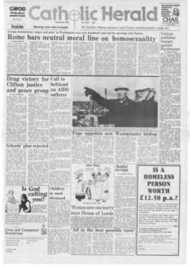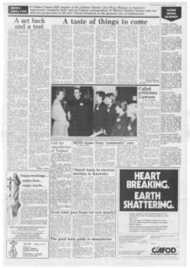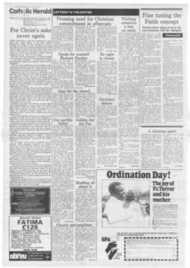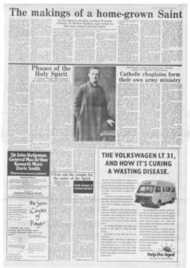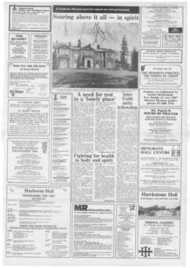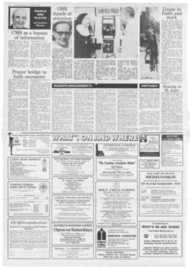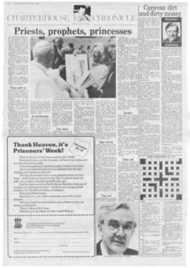Page 2, 7th November 1986
Page 2
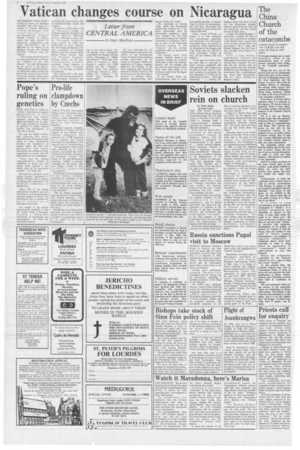
Report an error
Noticed an error on this page?If you've noticed an error in this article please click here to report it.
Tags
Share
Related articles
Archbishop Obando Y Bravo Of Managua And The Nicaraguan...
Vatican Hints At Policy Reversal
Nicaragua Banning Raises Tension
Change In Appeal Advised
Pluralist Roots Laid In Nicaragua
Vatican changes course on Nicaragua
Letter from CENTRAL AMERICA
by Gary MacEoin
ARCHBISHOP Paulo Giglio's arrival as nuncio in Managua coincides with other signs of a change in Vatican diplomacy toward Nicaragua from confrontation to accommodation. (Catholic Herald, October 3) Giglio's career has been marked by important assignments and rapid advancement. He is identified as the author of the dialogue between the . Chinese Patriotic Church and the Vatican.
"The mission of the Church is to form good citizens, to instruct our Catholics to love their country," he told Nicaraguans on his arrival at the airport. "What makes a good Christian? To fulfill one's duty, to obey the laws of the country; to love God, to love the country, to love one's neighbour, to open the heart to work and the conscience to obey the commandments of God and country."
An analysis of the reasons for the Vatican's change of direction made by the Jesuit-run Central American Historical Institute (Managua) notes that the Nicaraguan hierarchy's image around the world and particularly in Latin America has been badly damaged by the open complicity of Cardinal Obando and the recently exiled Bishop Pablo Antonio Vega with President Reagan's bellicose policy. As the only predominantly Catholic continent, Latin America is John Paul It's "strategic reserve" in his plan to restore Christendom.
Also noteworthy is the open conflict between the position of the Nicaraguan hierarchy and that of the United States. The US bishops have consistently condemned the Reagan policies toward Nicaragua as "illegal and immoral." While they were calling on Congress to reject Reagan's request for $100 million for the "contras", Bishop Vega was publicly supporting Reagan's plea, calling the "contras" "my people" and "defenders of human rights". He even defended the US Administration's ignoring of the verdict of the International Court of Justice and justified a possible intervention by US troops in Nicaragua. Within the realpolitik of Vatican longterm diplomacy the bishops of the most organised and financially powerful Catholic church in the world count for far more than a handful of bishops whose political manoeuverings have become much too visible.
The expulsion of Bishop Vega, which the Nicaraguan government insisted was a far lesser punishment than his contentions statements could have brought, has had little repercussion among the Catholic community in Nicaragua. This is due in part to the continuing barbaric attacks by the "contras" on the civilian population and on agricultural production.
The people know their enemies. Another factor is an awareness among the Catholic public that at least some bishops identify with the wealthy and not with the poor masses. Even Pope John Paul seems to be coming to realise that Nicaragua is not Poland.
In the United States the Administration used its entire
propaganda machine to present Vega as victim of persecution. But even here, the impact has been blunted by an article in The Atlantic Monthly.
Conor Cruise O'Brien, its author, is an Irish statesman with international experience and reputation. In a thoroughly researched piece, he presents a perspective which demonstrates the absurdity of the Reagan and Vega claim that the Church is being persecuted. Today, he says, we are dealing with new realities.
"In the past the United States has been able to intervene in Latin America repeatedly and with impunity. But things are a bit different now; there is a new spirit around. In particular, the new alignment of el Dios de los pobres and la patria — faith and fatherland — is shifting the
balance. Pope John Paul II took on that formidable alliance without quite knowing what he was taking on, and then found he had to back away.
In June, President Reagan, in personally swinging the House vote, and in defying the findings of the World Court, seemed still to be moving toward direct US intervention. But I hope that Ronald Reagan, like the Pope, may yet back away before it is too late."
After a long hiatus, negotiations between the Nicaraguan government and the bishops have resumed. The fact that the new nuncio, who no longer divides his time between Honduras and Nicaragua as his predecessor did, is participating has raised high expectations. This is a major set-back for Reagan's plans.
blog comments powered by Disqus


